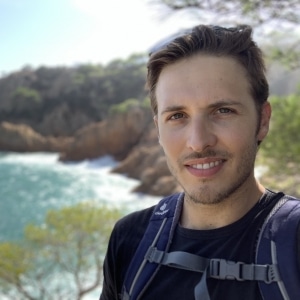My PhD path makes me feel helpful because I can help provide uncontaminated water to people. Specifically, I support research to innovate water treatment technologies. In fact, due to climate change, securing a water supply is and will be increasingly important.
For this reason, it is essential to remove persistent contaminants contained in pharmaceuticals or personal care products that usually end up in rivers or seas from our homes. To eliminate these dangerous substances, I use graphene, a highly conductive nanomaterial combined with microorganisms.
Although biological treatments are often used to remove pollutants in wastewater treatment, their effectiveness against the contaminants listed above is low. This is why I use a conductive material, such as graphene, which increases the speed of information exchange between microorganisms and thus accelerates the removal processes of persistent pollutants.

To undertake a researcher’s path, you need certain agility to move from one task to another without interruption. You spend most of your time between the laboratory and desk. It would be best if you had great organizational ability and resilience: a researcher often explores new fields and situations and must know how to experience failure and learn from it.
It wasn’t easy for me at first: I always preferred to do only one thing well at a time. That’s why it’s essential to be able to plan your day ahead of schedule and always have a plan B in case something goes wrong.
Instead of trying to express and manage my sense of frustration, I suppress it and try to move on. The problem is that repressing my emotions because they are negative and, therefore, unwanted, will not make me solve anything. On the contrary, the energy I use to control my sense of frustration ends up emotionally draining me. Even though I am not physically tired, my mind becomes less lucid and less reactive.
Recently I have been trying to implement a new strategy: give it space, let it vent, and then manage it. By allowing myself to accept it, rather than repressing it, I can use it in a useful way, to do something constructive.

Building relationships with the people you meet on day one will be crucial. Although you don’t choose the people that you will find, your approach will be fundamental to build relationships that will be with you for at least a few years.
In my case, I’m in a project with 13 other students, and all committed to finding new technologies to ensure uncontaminated water for people. The first meeting together was an opportunity to do team building and start creating something together. We decided to commit ourselves to publish weekly blog articles: we want to spread our research and stories to those who are not in our field.
Finally, take control of your PhD from day one. Remember that although you have one or more supervisors who can provide guidance, you are the one who ultimately take decisions.
My PhD has a substantial period within a research center (ICRA, Catalan Institute for Water Research). Here I have at my disposal sophisticated equipment and a vast network of people and researchers. I am in daily contact with internationally recognized professionals, both working here and external visitors. Often the answer to your questions is just waiting around the corner of your office.

I like reading books about personal growth and communication in science. I am convinced that in the scientific world, both internal and external communication (raising awareness and involving citizens) is often too much neglected as it is crucial. I love to feel the fresh wind and the warmth of the sun on my face while skiing, and I enjoy walking in nature. I also like talking about psychology and leadership.
Instagram | Personal LinkedIn | Project Website | Project Twitter | Project LinkedIn

